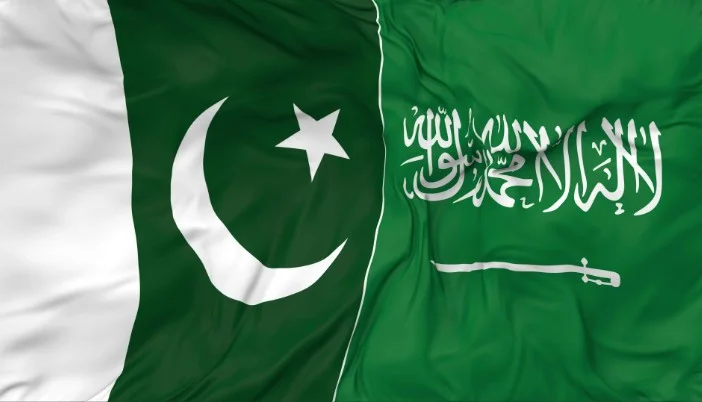By: Mehreen Akhtar
A significant step in strengthening their defence and security cooperation was taken in September 2025 when Saudi Arabia and Pakistan signed the Strategic Mutual Defence Agreement (SMDA). A strong desire for greater collective security among Muslim nations is evident in the pact, which commits both parties to treat any assault against one as aggression against both.
This partnership gives both countries a stronger voice in Muslim world politics by focusing on diplomacy, the economy, and regional peace, in addition to promoting peace. This agreement gives Saudi Arabia a powerful military ally. Pakistan is the only nuclear state in the Muslim world and possesses one of the most highly skilled armies.
Pakistan’s defence proficiency and front-line military capabilities will be beneficial to Riyadh through this alliance, particularly at a time when U.S. engagement in the Middle East is waning. The SMDA offers Pakistan both economic and political advantages. It reinforces Islamabad’s position as a regional balancing force and links it to Saudi Arabia’s Vision 2030, which offers significant investment opportunities that can help expand Pakistan’s economy.
The agreement serves as an economic boost as well as a security measure. It encourages trade collaboration, military instructions, and the exchange of defence technology.
Additionally, it can establish energy alliances that aid Pakistan in addressing its economic issues. The agreement reduces Saudi Arabia’s reliance on Western support while advancing its defences.
This partnership creates a balanced and independent power in the Gulf by uniting the largest monarchy and the only Muslim state with nuclear power. Every country has unique advantages that benefit the other. Saudi Arabia possesses stable finances, gold assets, and energy resources. Mecca and Medina, the two sacred Islamic towns, are located there as well, which gives it spiritual influence and moral leadership among Muslims.
Comparatively, Pakistan has a highly developed defence industry, advanced missile technology, and a powerful, tested military. Its intelligence organisation, the ISI, is renowned for its worldwide capabilities, and its armed forces also provide training to soldiers from several Arab nations. Saudi Arabia and Pakistan are a perfect strategic combination because of their combined advantages.
On a global level, the timing of this agreement is very crucial. It was signed not long after the Israeli invasion of Qatar, which made many Gulf states realise that they could not solely rely on American security. This incident encouraged Saudi Arabia and other Arab countries to look for reliable Muslim allies. Pakistan’s strong military and friendly relations with the Gulf monarchs made it the natural choice.
This indicates a new trend: Muslim countries are now attempting to establish collective security mechanisms rather than relying exclusively on Western powers. Additionally, the SMDA facilitates further collaboration within the Muslim world.
The Islamic Military Counter Terrorism Coalition (IMCTC), established in 2015 by former Pakistani army chief General Raheel Sharif, might serve as the foundation of a single Muslim defence structure. The coalition, which now has 43 countries, is not particularly active. It might convey a powerful message of strength and power if it were expanded to other Muslim nations, like Iran.
Furthermore, it might shield Muslim nations from future dangers and help in stopping Israeli aggression in Gaza, indicating that the Islamic world can come together for justice and peace. A “Muslim NATO”, or unified defence system for Muslim nations, may eventually result from this, according to some experts.
Such an alliance already has the groundwork in place; it just needs cohesion and capable leadership. This would provide Pakistan with more security support and make it more significant diplomatically. It would help Saudi Arabia reduce its dependence on Western technology for defence and sustain its position as a leader in the Muslim world.
Moreover, it would encourage the Islamic community to have a more independent security system. But regional politics are also impacted by the accord. India, as well as Iran, is among the nations keenly monitoring this development. Their security estimates are altered by the statement that “an assault on one is an assault on all.” India would interpret it as a shift in Pakistan’s defensive strategy, while Iraq would consider it a challenge to its hegemony.
Nonetheless, both Riyadh and Islamabad have made it clear that the SMDA is defensive rather than offensive, and that its goal is regional peace and advancement. Conclusion In brief, the Muslim world’s strategy of collective security has entered a new phase with the signing of the Pakistan-Saudi Defence Pact. It demonstrates a willingness to improve inter-Islamic collaboration and lessen reliance on Western forces.
However, how both nations carry out the deal will be the true test. It will just be a symbolic gesture if it stays on paper.
However, a new and durable order of security for the Muslim world may begin if Saudi Arabia and Pakistan can establish genuine, cooperative defence structures founded on openness and trust.

